If you are fascinated by the events that shaped the world and continue to impact people, cultures, and entire civilizations, an online history degree might for you.

Editorial Listing ShortCode:
Getting your Bachelor of History is easier than ever before, and there are a number of online options available.
Universities Offering Online Bachelors in History Degrees
Methodology: The following school list is in alphabetical order. To be included, a college or university must be regionally accredited and offer degree programs online or in a hybrid format.
1. Arizona State University
Arizona State University spans five campuses in downtown Phoenix and is a highly celebrated school in the area. It is one of the largest universities in the country and has four independent research centers throughout the state of Arizona. Founded in 1885, Arizona State offers degrees for all education levels.
- BA in Art History
- BA in History
Arizona State University is accredited by the Higher Learning Committee.
2. Bellevue University
Established in 1966, Bellevue University is one of the premier destinations for adult learners in the state of Nebraska. With a heavy focus on lifelong learning, Bellvue University boasts an 80 percent rate of learners older than 25. Students can earn their bachelor’s degree online or in the classroom.
- BS in History
Bellevue University is accredited by the Higher Learning Commission.
3. Clayton State University
This public university was established in 1969 and recognized by U.S. News & World Report as one of the top schools in Morrow, Georgia. Offering bachelor’s and master’s degrees, Clayton State University is a beautifully appointed campus right outside of Atlanta, with plenty of picturesque nature on its 192 acres of grounds for students to visit between classes.
- BA in History
- BA in History – Secondary Education
Clayton State University is regionally accredited by the Southern Association of Colleges and Schools Commission on Colleges.
4. Columbia College
This online and brick-and-mortar school was founded in 1851 and began offering online degrees in 200. Columbia College offers associate’s, bachelor’s and master’s degrees in a variety of concentrations. Located in picturesque Jacksonville, Florida, Columbia College is an excellent option for students who want to further their education in the sunshine.
- BA in History
Columbia College is accredited by the Higher Learning Commission.
5. Florida International University
Founded in June of 1965, Florida International University is one of the country’s premier research schools offering both graduate and undergraduate degrees. It is recognized as part of the State University System of Florida. It is one of the only schools in the state to boast the “Emerging Preeminence” honor from the Florida government.
- BA in History
Florida International University is accredited by the Southern Association of Colleges and Schools Commission on Colleges.
6. Granite State College
Offering associate’s, bachelor’s and master’s degrees; Granite State College is one of the best public colleges in the North, according to U.S. News & World Report. It’s located in lovely Concord, New Hampshire, and was established in 1972. Students enjoy several different concentrations and can study surrounded by the beautiful nature of New Hampshire.
- BA in History
Granite State College is accredited by the New England Commission of Higher Education.
7. King University
King University offers both in-house and online graduate and undergraduate degrees in a variety of different concentrations, including business and nursing. It was founded in 1867 in Bristol, Tennessee, and is a religious institution with ties to the Evangelical church. King University’s online programs offer flexible programs to get your degree.
- BS in History
King University is accredited by the Southern Association of Colleges and Schools Commission on Colleges.
8. Liberty University
Established in 1971, Liberty University is one of the most prominent evangelical universities in the country. Located in Lynchburg, Virginia, this school offers both associate’s and bachelor’s degrees in a variety of different studies. It’s a highly popular school and offers online and in-house classes for students from all across the country.
- BS in History
Liberty University is accredited by the Southern Association of Colleges and Schools Commission on Colleges.
9. Mary Baldwin University
Offering bachelor’s and master’s degree programs, Mary Baldwin University is one of the most elite private schools in Virginia. It was founded in 1842, and since then, has maintained an unparalleled standard of excellence. This school is most appropriate for students who want to focus on health and business-related career paths.
- BA in History
MBU is accredited by Southern Association of Colleges and Schools, Commission on Colleges.
10. Nicholls State University
Established in 1948, Nicholls State University offers bachelor’s and master’s degrees in a variety of different disciplines, including education, nursing and business administration. It offers dozens of different degree paths. Nicholls State University is located in Thibodaux, Louisiana, and is included in the prestigious University of Louisiana System of universities.
- BA in History
Nicholls State University is accredited by the Southern Association of Colleges and Schools Commission on Colleges.
11. Northern Kentucky University
This public university offers predominately undergraduate programs and is well-known for its robust liberal arts school. Recently, Northern Kentucky University has excelled in the scientific field, offering degrees in various disciplines related to chemistry and biology.
Founded in 1968, Northern Kentucky University is a notable school located in Highland Heights, Kentucky.
- BA in History
Northern Kentucky University is accredited by the Southern Association of Colleges and Schools Commission on Colleges.
12. Northwestern State University of Louisiana
This Lousiana-based school is well-known for its excellent nursing program and offers degrees for people of all academic levels and ages. Established in 1884, the Northwestern State University of Louisiana has several different campuses, including ones in Shreveport, Alexandria, and Leesville/Fort Polk. It is a distinguished school in the region.
- BA in History
Northwestern State University is accredited by the Southern Association of Colleges and Schools Commission on Colleges.
13. Oregon State University
Founded in 1868, Oregon Stae University is one of the dominant public research facilities in the country. Offering over 200 undergraduate degree options, as well as a plethora of doctoral and graduate degree choices, Oregon State University is a powerhouse in the field of academia. It’s also a vast campus, with over 32,000 students enrolled.
- BA in History
- BS in History
Oregon State University is accredited by the Northwest Commission on Colleges and Universities.
14. Ottawa University
This Baptist university was founded in 1865 and offers undergraduate degrees in a variety of different subjects. You can get your degree in Christian studies or many other subjects like biology or business administration. Their main campus is located in Ottawa, Kansas, but they have a second one in Surprise, Arizona.
- BA in History
Ottawa University is accredited by The Higher Learning Commission.
15. Pennsylvania State University
Offering degrees for all levels, prestigious Pennsylvania State University was founded in 1855 and remains one of the most prestigious schools in all of the United States. Students can take classes in-house or online as part of their World Campus initiative.
Pennsylvania State University has been recognized as an outstanding research university by the Carnegie Foundation.
- BA in History
Pennsylvania State University is accredited by Middle States Association of Colleges and Schools.
16. Regent University
Established in 1977 by Pat Robertson, Regent University was initially called Christian Broadcasting Network University until it changed its name in 1990. Offering bachelor’s, master’s and doctorate degrees in a number of different studies, Regent University can accommodate both traditional students and online learners of all different levels.
- BA in History
Regent University is accredited by the Southern Association of Colleges and Schools Commission on Colleges.
17. Sam Houston State University
This public university located in Huntsville, Texas, offers bachelor’s degrees as well as some graduate options and certificates. Established in 1879, Sam Houston State University is one of the oldest schools in all of Texas, and its legacy is evident in the lovely design of its campus and the school pride you can find there.
- BA in History
Sam Houston State University is accredited by the Southern Association of Colleges and Schools Commission on Colleges.
18. Southern New Hampshire University
Founded in 1932, Southern New Hampshire Univerity offers degrees for every level of education and is one of the most respected schools in New Hampshire. A private university, it’s located in picturesque Manchester. Get your degree traditionally or online at this prestigious and acclaimed school.
- BA in History – American History
- BA in History – European History
- BA in History – Military History
Southern New Hampshire University is accredited by the New England Commission of Higher Education, Inc.
19. Texas State University
Texas State University has degrees for all levels of education and specializes in food sciences, business administration, and humanitarian studies. They also have a thriving performing arts school. Established in 1899, Texas State University started with a modest 303 students but has since grown to be one of the top universities in the country, according to U.S. News & World Report.
- BA in History
Texas State University is accredited by the Commission on Colleges of the Southern Association of Colleges and Schools.
20. Thomas Edison State University
Founded in 1972, Thomas Edison State University lives up to its namesake by being one of the top schools in the country, according to College Factual. Located in Trenton, New Jersey, it operates mostly online and caters to adult learners, offering graduate and undergraduate degrees. It’s a highly acclaimed and reputable institution with a great track record.
- BA in History
Thomas Edison State University is accredited by the Middle States Commission on Higher Education.
21. University of Arizona
Offering graduate and undergraduate degrees in the sciences and humanities, the University of Arizona is named by U.S. News & World Report as one of the country’s top schools. Established in 1885, it’s known for being one of the top public research facilities in the country. You can attend this university in lovely Tucson, Arizona.
- BA in History
The University of Arizona is accredited by the Higher Learning Commission.
22. University of Central Florida
Founded in 1963, this top Floridan school is one of the best public research facilities in the entire country by U.S. News & World Report. The University of Central Florida is located in sunny Orlando and has more students enrolled on campus than any other school in the whole country. You can get your graduate or undergraduate degree at this prestigious school.
- BA in History
The University of Central Florida is accredited by the Southern Association of Colleges and Schools Commission on Colleges.
23. University of Idaho
This premier university offers a variety of different degrees in agriculture, animal husbandry, and other disciplines. You can get your graduate or undergraduate degree from the school. Founded in 1889, it has the distinction of being the biggest land-grant primary research school and was featured in the Idaho Space Grant Consortium.
- BA in History
- BS in History
The University of Idaho is accredited by the Northwest Commission on Colleges and Universities.
24. University of Illinois – Springfield
Established in 1969, the University of Illinois- Springfield offers undergraduate, graduate and doctoral degrees. It was officially recognized as a significant player in the University of Illinois system on July 1, 1995, and is recognized as being a titan when it comes to higher education.
- Bachelor’s in History
The University of Illinois Springfield is accredited by the Higher Learning Commission
25. University of Louisiana – Monroe
Founded in 1931, the University of Louisiana-Monroe is a cherished part of the University of Louisiana system and named by U.S. News & World Report as one of the best national universities in the country. Students can get their undergraduate or graduate degrees from this university in a number of different fields, including criminal justice and health sciences.
- BA in History
The University of Louisiana at Monroe is accredited by the Southern Association of Colleges and Schools Commission on Colleges.
26. University of Maryland Global Campus
Offering both bachelor’s and master’s degrees online, the University of Maryland Global Campus is one of the top schools for people who want to focus on criminal justice, cybersecurity and accounting. Established in 1947, this school shifted focus to online lifelong learning in 2019. U.S. News & World Report named it as one of the best universities in the area.
- BA in History
UMGC is accredited by the Middle States Commission on Higher Education.
27. University of Nebraska – Kearney
Founded in 1905, the University of Nebraska-Kearney went through several name changes, including being known as the Nebraska State Normal School. Today, it’s simply known by its current name and offers many different bachelor’s and master’s degrees in a variety of different subjects like athletic training and business administration.
- BA in History
The University of Nebraska at Kearney is accredited by the Higher Learning Commission.
28. University of North Alabama
This school has the honor of being the state’s oldest four-year public university, established in 1830. The University of North Alabama is a legacy player, offering degrees in all levels of education and sprawling out over a beautiful 130-acre campus. It is truly the gold standard of schools in the American South.
- BA in History
- BS in History
The University of North Alabama is accredited by the Commission on Colleges of the Southern Association of Colleges and Schools.
29. Washington State University
Washington State University was founded in 1890 and is one of the most prestigious schools in all of the United States. It offers a plethora of different graduate and undergraduate programs, including 95 undergraduate majors to choose from. Students can get their master’s or doctoral degrees from Washington State University as well.
- BA in History
Washington State University is accredited by the Northwest Commission on Colleges and Universities.
30. Westfield State University
Founded in 1838, Westfield State University is one of the oldest schools in the country. It is known for being an inclusive institution that was one of the first to establish non-discrimination policies towards its students. Offering an array of undergraduate and graduate classes, this is a legacy school.
- BA in History
Westfield State University is accredited by the New England Commission of Higher Education.
Online History Degrees
When you get your Bachelor of History, you may find that there are a diverse amount of career opportunities right at your fingertips.
You may be able to work in museums or libraries, teach, or even travel the world, learning about ancient civilizations and piecing together clues that illuminate how our world came to be shaped. There are also tremendous opportunities for growth in many history disciplines.
American History

American history is a vibrant and complicated mixture of governmental arms, land expansion, various conflicts, and the rise of the United States to the status of a superpower over the 20th century. This particular concentration also deals with the founding of the original colonies, and what sets the United States apart from other nations.
Editorial Listing ShortCode:
American history is a fascinating concentration that can be applied to a number of different schools, museums, or national parks. The best candidates for this career path have a natural curiosity about history and can piece together clues and unravel the mysteries of the past.
It also helps to be fascinated with the evolution of American history.
Asian History

Asia is a vast region of the world divided into sub-regions that each have their own individual culture, language, and past. Many Asian history concentrations deal with all of the moving parts that make this region unique and break up the area into South, East, and Southeast Asia.
Editorial Listing ShortCode:
You will likely learn about the Mughal period: a time that shaped the region, as well as other epic empires that rose in places like Thailand and Cambodia. The more recent atrocities of the last century, like the Khmer Rouge, will most likely fall into the equation as well. The best candidates will need to have an open mind, and being bilingual is a significant plus.
European History

European history might seem a lot like American history on the face, but the two are quite different. Europe originated in a far more historically conventional way: with early monarchs and serfdoms, whereas the United States is a much more modern country.
Editorial Listing ShortCode:
Your focus on European history will probably look at the continent from the medieval times to modernity, and talk about why some countries gained a lot of power while others were left by the wayside. The best candidate for this course of study will be able to memorize dates and figures and understand concepts on micro and macro scales.
Middle Eastern History
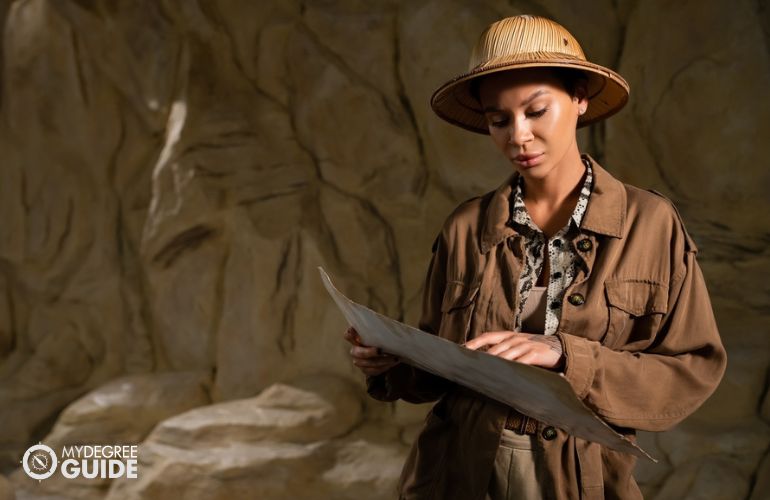
The Middle East was one of the most important regions of the ancient world, so anyone who wants to study the formation of old civilizations or work as an archaeologist might consider concentrating on this area of the world.
Middle Eastern history combines the rich history and culture of the land and ancient people, and also has a religious slant in modernity. By studying this realm of history, you can become familiar with the old powerhouses of the day and learn how they factor into the modern world. Being bilingual is a huge plus if you want to pursue this particular direction.
Editorial Listing ShortCode:
If you decide to continue on with your schooling, you could potentially make a fairly decent income with your history degree. Although there are many self-proclaimed history enthusiasts in the world, very few of them have the formal education to back up their passions.
Bachelor’s in History Curriculum & Courses

Although every college will vary, there are a few typical courses that you can expect to take as part of your Bachelor of History.
- History of Western Civilization: This foundational course can give you a good understanding of the rise and fall of certain influential empires and why they impacted the course of history. It’s an excellent base for a concentration in European history.
- Archaeological Overview: Archaeology is an exact science, and the methods used to collect and analyze ancient artifacts are time-honored traditions and skills.
- Geography and Anthropology: If you’ve always wondered why some humans settled where they did, this course is for you. It details the history of humanity through their movements and is a good foundational course for an archaeology concentration.
- Women’s History: In every country around the world, women have struggled to obtain and keep fundamental rights. The unique history of women is one of the critical elements of a Bachelor of History.
- Subjective History: It’s often said that the winners write history, and this class tackles that exact presumption by looking at how much of what we know is subjective.
- A Comprehensive Overview of The Crusades: The Crusades was a series of essential wars that drew the map of what is much of Europe and the Middle East today.
- Twentieth-Century History: The twentieth century was full of significant historical events and power shifts across the globe. This area of history includes the two World Wars, the Cold War, and the rise of the United States.
- Viking History: Medieval History: Vikings were the first sea-faring conquerors, and many people think that they were the first to discover North America, other than the indigenous people who lived there.
- American Government and Politics: The American system of government is balanced precariously on the notion of checks and balances. It’s a remarkable system to comprehend if you want to appreciate American democracy.
- Understanding the Ancient World: The ancient world set the stage for many alliances and conflicts today. Understanding how it operated is vital for any history major.
Depending on your concentration, you’ll also take additional classes that coincide with your ultimate career goals.
Bachelor’s in History Concentrations & Specialties

We previously reviewed some of the primary specialties that you can focus on with your Bachelor of History, but there are a few others that you might be suited for. Here is a more comprehensive list of your options.
- American History: American history deals with the formation of the country, the importance of the original colonies, conflicts at home and abroad, and the rise of American power in the twentieth century. If you want to work in a museum, school, or historical site in the United States, consider this concentration.
- Asian History: Asia has a long history of global dominance and significant civilizations. From the famous Khmer Empire to the rise of Genghis Khan, there was a ton of power in ancient Asia. Today, Asia continues to be on the cutting edge of science and technology, and concentrating in Asian history can give you an overview of the importance of this region today and in the future.
- European History: This concentration can teach you about Europe’s foundation, the wars fought on the continent, and how vital institutions like the European Union were formed. You can also learn how Europe is important in the modern age.
- Middle Eastern History: The Middle East was one of the most critical places for commerce and trade in the ancient world. Learning about the principal cities and ports of the old Middle East is a great way to launch yourself into a career as an archaeologist or scholar.
- Military History: Military history has its own specialization because there is an art to a conflict that doesn’t exist in times of peace. In this concentration, you can learn about all of the various techniques that were used during the major wars, as well as current hot spots and conflict zones.
- Roman History: The Roman Empire was one of the most important empires that ever existed. The vast influence of Rome made it an ancient-day powerhouse. Roman history is long and complicated enough to merit its own specialization.
Many colleges let you study any of the specializations above, or create your own based upon your career goals.
History Careers & Salaries
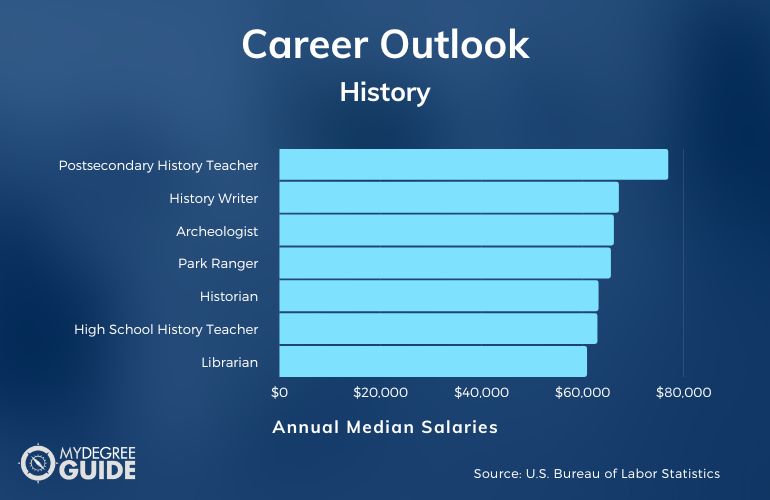
With your Bachelor of History degree, you can work in a number of different industries. Many graduates find themselves gravitating towards the academic field, becoming teachers or researchers, and helping new students grow to love history.
Others prefer to tackle more practical challenges by working out in the field, digging up archaeological treasures, and analyzing them. You can work as an archaeologist yourself, or as an assistant or researcher. The best candidates in this field often find themselves making quite a bit of money, and living rewarding and exciting lives.
Others work by translating old texts and giving context to the relics located in other parts of the world. Many times, being bilingual and working in the historical field go hand-in-hand, so if you really want to get a leg-up, it’s good to brush up on another language.
Ultimately, you can do quite a bit with your Bachelor of History, although some jobs are competitive, and candidates with additional schooling might be given preference. According to the U.S. Bureau of Labor Statistics these are some of the most popular jobs for those who have their Bachelor of History degree.
Of course, salaries will vary depending on your experience and how competitive the market is. These are merely ballpark numbers to give you an idea of what to expect.
| Careers | Annual Median Salary |
| Postsecondary History Teacher | $76,890 |
| History Writer | $67,120 |
| Archeologist | $66,130 |
| Park Ranger | $65,540 |
| Historian | $63,100 |
| High School History Teacher | $62,870 |
| Librarian | $60,820 |
| Curator | $56,990 |
| Museum Archivist | $56,760 |
| Research Assistant | $49,210 |
Many of these jobs offer ample room for growth, so if you get your foot in the door, most people can rise up fairly quickly. If you have a love of history, a need to investigate mysteries, and a talent for putting data together, you should be able to excel in any of these highly coveted fields.
What kind of job can I get with a history degree?

In addition to the jobs that we already listed above, there are plenty of opportunities to use your Bachelor of History degree in creative and lucrative ways.
Many employers see a history degree as a sign of a very curious mind and someone who is willing to study hard and put together a lot of different clues. It shows that you have a good work ethic and aren’t afraid of putting in the time to get to the bottom of things.
- Teacher’s Assistant
- Journalist
- Civil Service Administrator
- Ghostwriter
- Editorial Assistant
- Marketing Executive
- Consultant
- Facility Planner
- Television Advisor
You can leverage your Bachelor of History to excel in any of the positions listed here. Knowing about how the past correlates to the present is a vital skill that will take you far in your chosen career path, even if you get a more advanced degree in a different area of study.
Accreditation
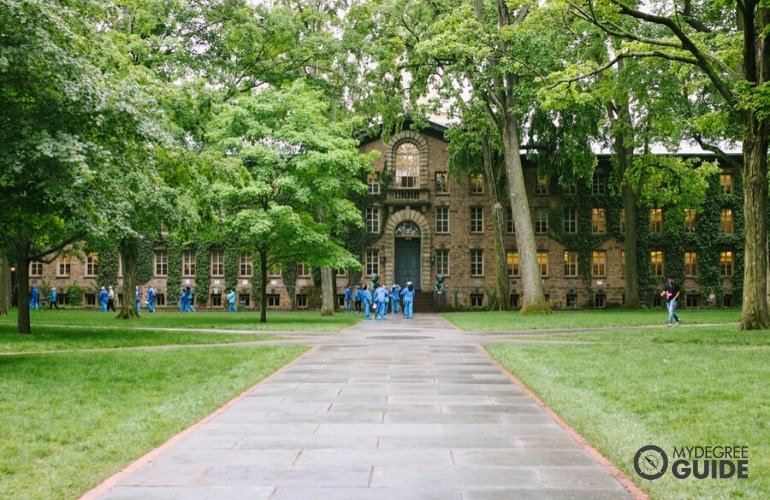
When choosing a college, it’s important to consider regional accreditation. Essentially, regional accreditation is a way for colleges and universities to show that they have credibility.
Regional accreditation is only given to colleges and universities that pass specific criteria, and whose curriculum is shown to be on-par, or above, the standard of excellence set by experts in the field. By choosing an educational institution that has regional accreditation, you are putting yourself in a better position to get a job after graduation.
Companies look for regionally accredited schools when hiring their candidates. Although regional accreditation is essential, schools can also be federally accredited. It’s best to look for a school that has a mixture of both, to make sure that you’re on the right track with your academic goals.
You can find this information online, or simply call the school and ask them.
History Professional Organizations

It’s no secret that professional organizations can be instrumental in helping you get ahead in your career, and the fields associated with history are certainly no exception.
There are national, statewide, and regional organizations that you can join, and some are even geared towards concentrations within the field. Here are a few organizations that can offer you a big bang for your buck and be worth joining.
American Association for State and Local History: This organization is one of the oldest in the country, and it focuses on uniting history professionals and aficionados from all over the map. If you join it, you can benefit from a tremendous amount of networking and maybe even open up professional doors for yourself.
Organization of American Historians: If you only join one organization after graduation, consider this one. The Organization of American Historians is a tremendous resource for those just starting out, specifically in terms of finding that dream job.
National Council on Public History: Ever since 1979, the National Council on Public History has been one of the best tools for those who want to start off on the right foot in a career in history. This organization links up people in all levels of their job and can open up doors and resources for those who want to develop resource materials and further their careers.
It’s always a good idea to start networking right away. Join these organizations and start your career on the right foot!
Bachelor’s in History Admissions Requirements

Although all schools are different, there are a few requirements that you should expect the Admissions Department to ask you for.
Although some schools will ask you for your standardized test scores, they are not a blanket requirement any longer. It’s always good to have them on-hand, just in case they are needed, but you probably won’t be asked to provide them.
There are a few documents that you will be expected to have. Make sure that you are prepared, and getting into the school of your choice will be smooth sailing.
Online Application: In most cases, you will be required to fill out your application online. Many people find that it takes at least half an hour to complete, and you should be prepared to offer your financial, personal, and professional information on the application.

Personal Essay: Colleges like to get an idea of who you are, so many of them will ask you to submit a personal essay. Keep it professional, but make sure the highlight what makes you unique and a good candidate.
References: It’s standard for colleges and universities to ask for reference letters. Avoid getting them from peers, and instead ask trusted teachers, advisors, or mentors for the letters.
Transcripts: your transcripts are records of your grades and let the college or university of your choice know if you’ve taken any A.P., or Advanced Placement, classes that might qualify for college credit.
The school will review all of these documents and determine if you make an excellent candidate.
Financial Aid & Scholarships

No matter if you decide to go to a brick-and-mortar university, or attend an online one, you have plenty of options when it comes to financial aid.
These days, many people find it very difficult to pay for college, so there are state, federal, and even university-based programs that can ease the burden of college debt and let you study worry-free.
Scholarships are just one of the opportunities at your fingertips. Typically there are two types of scholarships: merit-based scholarships that reward excellent students and prospects with money for school, and income-based scholarships for those who qualify as in need of financial assistance.
You can get multiple scholarships, and it’s worth applying for all of the ones that you think you might qualify for. You might get turned down for one or two, but you won’t know unless you try.

Grants are similar to scholarships in that you don’t have to pay them back. If you served in the United States Armed Forces, you may have plenty of grant options. You might also qualify for merit-based federal grants. There’s a list of grants online, so make sure you check it out before applying.
Loans are the most common type of financial aid, and many students find themselves taking out loans to cover their classes or books. You do have to pay them back, so don’t take out more than you can reasonably afford.
Some schools also offer grants and scholarships through their universities. You can check out your options online and apply for what you think you have a good shot of getting. These grants and scholarships tend to be highly competitive, so make sure you follow the requirements right down to the letter.
No matter what your financial situation is, there are many ways for you to fund your college education.
What Is A Bachelor’s Degree In History?
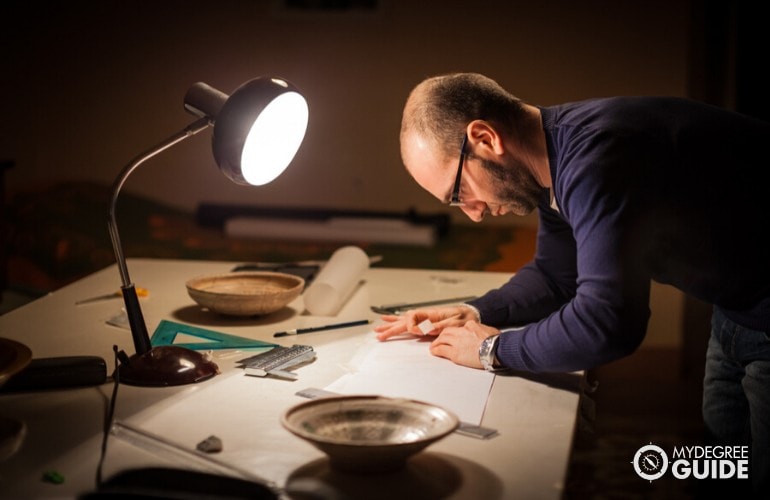
A Bachelor of History is a degree that allows you to do many different jobs in sectors all across the board. This degree can give you a foundational understanding of history, and how it provides context to the modern age. You can apply your degree in several different disciplines, including academia and the practical field of archaeology.
A Bachelor of History can also be a good jumping-off point for additional schooling, like a traditional or online Master’s in history or PhD.
How Long Does It Take To Get A Bachelors In History?
Although it generally takes four years to get your degree, some people can take a little bit longer or shorter depending on their schedule. Online classes can give you the benefit of flexibility, making them an excellent choice for adult learners.
You can customize your schedule and take as many credits as make sense to you. How long it takes for you to get your degree will largely depend on how many course hours you take each semester. If you have the time and urge to receive your degree quicker, you may want to consider getting an online accelerated history degree.
Is A Degree In History A BA or BA?

A degree in history is considered a B.A. or a Bachelor of Arts. These types of degrees tend to focus on social science, history, literature, and humanities. They are concerned with how societies were built, and what kind of cultures are in them.
B.A. degrees are very valuable because they are flexible enough to act as a basis for other types of majors. For example, you can build on your B.A. with a Master’s Degree in a more concrete discipline, or you can continue your education in history with a sharpened focus.
How Much Do History Majors Make?
Your salary will depend on many different factors, including how much education and experience you have. Generally speaking, the more knowledge or experience you have under your belt, the more you will make.
Those just starting off tend to make a lot less than experts in the field, but even novices generally start around $30,000 per year (Bureau of Labor Statistics) and can expect to make well over six-figures if they work their way up.
Of course, there are no hard and fast rules here. Depending on where you are in the country, what your concentration is, and how experienced you are, you will make a different amount of money. We can only give you ballpark figures and estimates.
Where Do Historians Work?
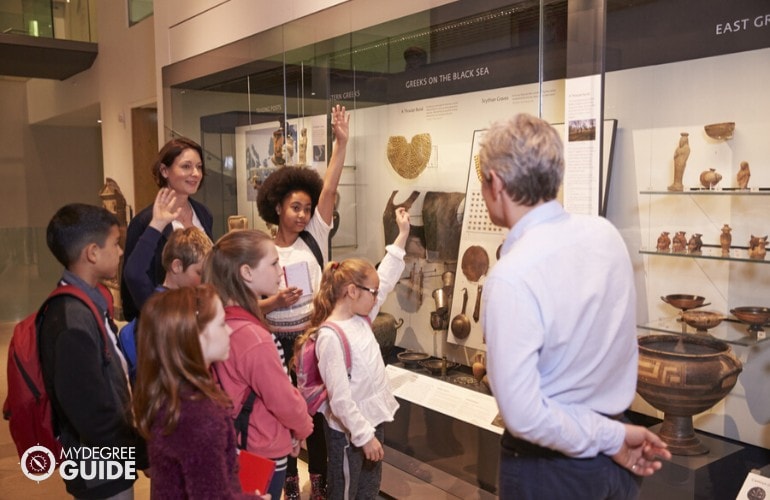
Some historians work in schools or libraries, writing research papers or teaching. Others work out in the field, or in historically renowned places of interest as curators.
Where you will work depends mostly on what type of concentration you opt for. If you decide to go into academia, you will most likely work in a college or school, and the bulk of your time will be spent in the classroom or your office. If you opt to be a curator, you probably be interacting with the public at all times and likely have to give tours.
Think about your personal work preferences when choosing a concentration. Do you prefer to be alone with your books, or does it energize you to be out in public? Do you have an aptitude for deciphering pieces of the past, or do you yearn to teach?
What Can I Do With A History Degree?
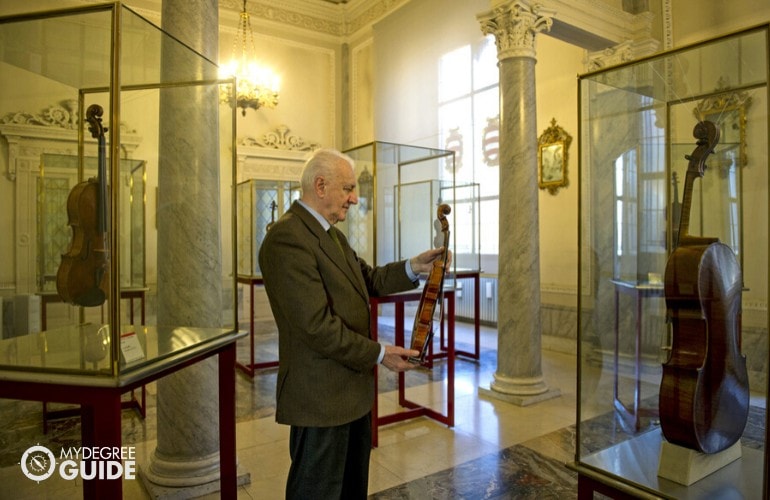
There are so many jobs that you can get with a Bachelor of History degree. You can work in academia as a professor, teacher, or aide. You can also find yourself on the research side of things, and come up with new, exciting discoveries that change the way we look at society and culture.
You can even use your history degree as a backdrop for another profession, like Political Science. It’s always good to have a fundamental understanding of the way the world works, and a history degree can give you that insight.
Is A History Degree Easy?
Some people think that getting their degree in history is easy, and others find it difficult. It depends on the person and what they expect out of the coursework.
History is not the same as some of the more technical courses of study because there are no labs, which is why some people think it’s a lot easier. On the other hand, you will need to read ancient texts and give your thoughts on historical events.
To be successful, you will need to be articulate, open-minded, and able to see the bigger picture.
Can You Name Some Of The Jobs You Can Get With A History Degree?
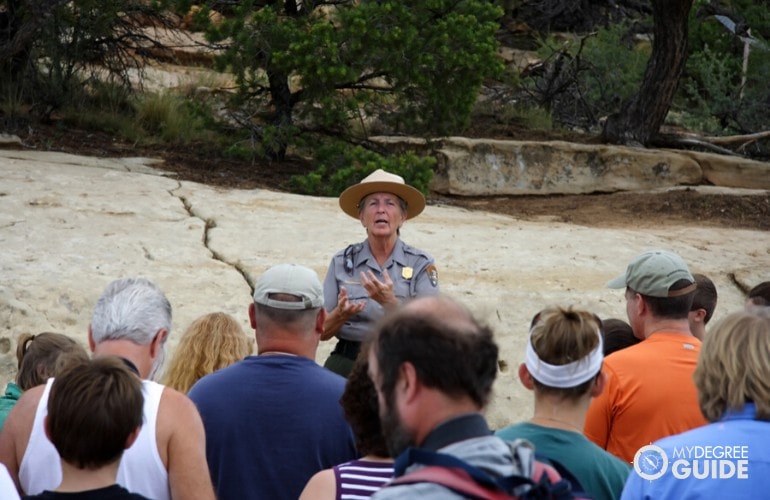
People who have their degrees in history can pursue work as museum curators or archivists, making sure that the information being presented is accurate. You can also pursue work as a teacher or even as a lawyer, mainly if your concentration is Constitutional Law.
Many people with history degrees work as researchers or ghostwriters. They can be interviewed as resident experts, or consulted on projects for which historical accuracy is needed. Many historians lend their services to Hollywood when historical movies are being made.
A Bachelor of History can be a great degree to get, and it can give you plenty of options for your future. There’s no reason not to take the plunge today!
Getting Your History Degree Online

Many people don’t have time to go to traditional colleges or universities, particularly if they are adult learners. If you want to get your history degree and maintain your own schedule in the process, consider applying to an online school.
Online schools are just as credible as traditional options, and you can find one that is accredited and provides an excellent education that will set you up with career options after graduating. It’s never too late to make the right move for your future, so apply today and get on the right track.
